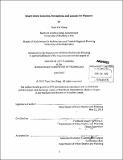Smart cities : concepts, perceptions and lessons for planners
Author(s)
Ching, Tuan Yee
DownloadFull printable version (46.68Mb)
Other Contributors
Massachusetts Institute of Technology. Department of Urban Studies and Planning.
Advisor
Joseph Ferreira, Jr.
Terms of use
Metadata
Show full item recordAbstract
Today, there appears to be a visible trend in the use of the "smart" prefix. For example, cities are branding themselves as, or striving to become "smart" cities. Planners and policy-makers espouse "smart growth". Infrastructure planning involves "smart grids" for energy, "smart networks" for information and communications technologies (ICTs) and "smart mobility" in transportation. The "smart" term has also been stretched, where being "smart" is trounced by being "smarter". Being "smart", or "smarter", is perhaps seen as the next frontier for city planning, policy-making and management. A common underlying theme in "smart" cities is the application of technology to city planning and management, that leads to greater optimization of time and resources. However, definitions of "smart" cities remain elusive, and an inadequate understanding may lead cities to possible image or technological traps, heavy investments in ICTs and infrastructure without maximizing their potential, or to focus on "smart" technologies for short-term solutions without adequately considering the long term. As cities grapple with rapid urbanization and goals for sustainable development, resource management and climate change mitigation, learning about being "smart" will be timely and invaluable for planners. This study examines six "smart" cities - Boston, San Francisco, Amsterdam, Stockholm, Singapore and Rio de Janeiro - assessing city officials' perceptions and concepts of "smart cities" and their "smart" initiatives. Their efforts and approaches are analyzed against four theories of "smart" cities; (a) "smart machines" and organization, (b) engaging communities, organizations and businesses, (c) learning and adaptation, and (d) investing for the future. From the research, learning points and best practices are extracted, to serve as an applicable guide for cities as they embark on their "smart" initiatives.
Description
Thesis (M.C.P.)--Massachusetts Institute of Technology, Dept. of Urban Studies and Planning, 2013. Cataloged from PDF version of thesis. Includes bibliographical references (p. 127-137).
Date issued
2013Department
Massachusetts Institute of Technology. Department of Urban Studies and PlanningPublisher
Massachusetts Institute of Technology
Keywords
Urban Studies and Planning.